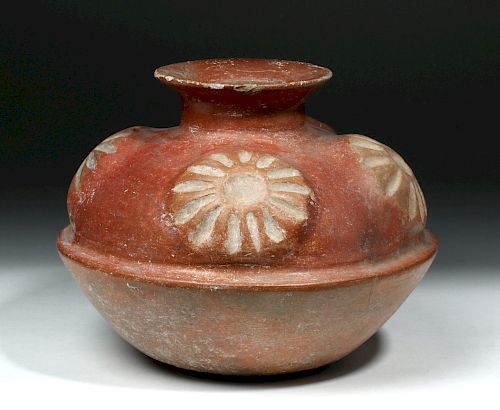Colima Redware Olla w/ Peyote Buttons
Lot 540
About Seller
Artemis Fine Arts
686 S Taylor Ave, Ste 106
Louisville, CO 80027
United States
Selling antiquities, ancient and ethnographic art online since 1993, Artemis Gallery specializes in Classical Antiquities (Egyptian, Greek, Roman, Near Eastern), Asian, Pre-Columbian, African / Tribal / Oceanographic art. Our extensive inventory includes pottery, stone, metal, wood, glass and textil...Read more
Estimate:
$1,600 - $2,400
Absentee vs Live bid
Two ways to bid:
- Leave a max absentee bid and the platform will bid on your behalf up to your maximum bid during the live auction.
- Bid live during the auction and your bids will be submitted real-time to the auctioneer.
Bid Increments
| Price | Bid Increment |
|---|---|
| $0 | $25 |
| $300 | $50 |
| $1,000 | $100 |
| $2,000 | $250 |
| $5,000 | $500 |
| $10,000 | $1,000 |
| $20,000 | $2,500 |
| $50,000 | $5,000 |
| $100,000 | $10,000 |
| $200,000 | $20,000 |
About Auction
By Artemis Fine Arts
Oct 17, 2019
Set Reminder
2019-10-17 10:00:00
2019-10-17 10:00:00
America/New_York
Bidsquare
Bidsquare : Early Fall Variety | Ancient & Ethnographic
https://www.bidsquare.com/auctions/artemis-gallery/early-fall-variety-ancient-ethnographic-4538
Discover incredible lots relisted with new, lower start prices (up to 50% less), plus many items brand-new to auction. Step back in time and around the world – you’ll be amazed at the treasures you will find. Antiquities from the Classics, Asian, Pre-Columbian African and much more! Artemis Fine Arts info@artemisgallery.com
Discover incredible lots relisted with new, lower start prices (up to 50% less), plus many items brand-new to auction. Step back in time and around the world – you’ll be amazed at the treasures you will find. Antiquities from the Classics, Asian, Pre-Columbian African and much more! Artemis Fine Arts info@artemisgallery.com
- Lot Description
**Originally Listed At $1200**
Pre-Columbian, West Mexico, Colima, ca. 300 BCE to 300 CE. A beautiful redware vessel of an overall gourd-like form with four peyote open blossoms in relief adorning the shoulder, a diminuitive cylindrical neck and dramatically flared rim, above a hemispheric lower body. The peyote blossom is of course associated with drug use, which we believe was ritually practiced in Colima by shamans. Perhaps this bowl graced the tomb of such an individual or held an offering of the plant. So stunning and replete with cultural associations. Size: 11.5" in diameter x 8.5" H (29.2 cm x 21.6 cm)
Colima, located on Mexico's southwestern coast, was during this time part of the shaft tomb culture, along with neighbors to the north in Jalisco and Nayarit. In this culture, the dead were buried down shafts -- 3 to 20 meters deep -- that were dug vertically or near vertically through the volcanic tuff that makes up the geology of the region. The base of the shaft would open into one or more horizontal chambers with a low ceiling. These shafts were almost always dug beneath a dwelling, probably a family home, and seem to have been used as family mausoleums, housing the remains of many related individuals. Vessels like this one were placed in the tombs in order to hold offerings.
Provenance: collection of the late Alfred E. Stendahl, Stendahl Gallery, Los Angeles, California, USA
All items legal to buy/sell under U.S. Statute covering cultural patrimony Code 2600, CHAPTER 14, and are guaranteed to be as described or your money back.
A Certificate of Authenticity will accompany all winning bids.
We ship worldwide and handle all shipping in-house for your convenience.
#126351Chips to rim. Pressure fissure on base. Normal surface wear commensurate with age. Old inventory label on underside. Nice root marks.Condition
- Shipping Info
-
All shipping is handled in-house for your convenience. Your invoice from Artemis Gallery will include shipping calculation instructions. If in doubt, please inquire BEFORE bidding for estimated shipping costs for individual items.
-
- Buyer's Premium



 EUR
EUR CAD
CAD AUD
AUD GBP
GBP MXN
MXN HKD
HKD CNY
CNY MYR
MYR SEK
SEK SGD
SGD CHF
CHF THB
THB














